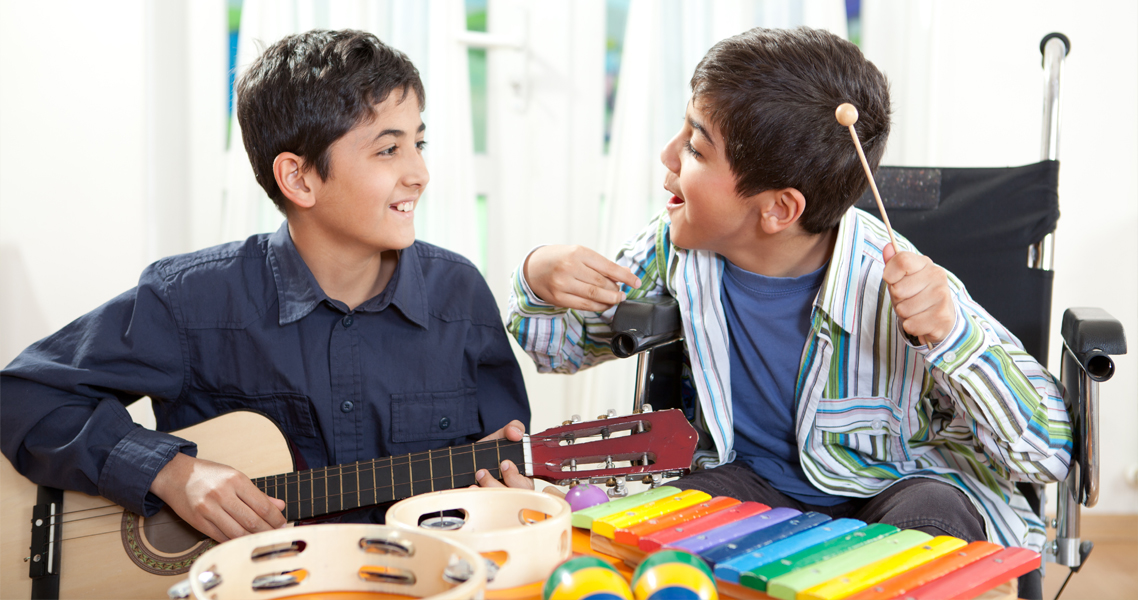
Music Therapy for Children
“It’s not just about creativity, it is about the person you’re becoming while you’re creating” -Charlie Peacock
Music addresses many different areas of the child. Please indicate any areas of need, or areas you would like to work on with your child, and detail any additional information. Examples may be counting, colors, balance, clapping, etc. Our board certified music therapists will work with your children to address developmental goals in the following areas:
Enroll your child for private music therapy sessions: https://bit.ly/MusicTherapyEnrollment If you have any questions, please give us a call or send an email.
Cost varies on session length
30 minutes = $50
45 minutes = $75
60 minutes = $100
** In-home services are available at an additional $5/session fee. We reserve the right to increase this fee based on the distance and convenience of our staff schedules. In-home services require a minimum weekly session length of 60 minutes.
Call to learn more.
NY (716) 422-0070
FL (813) 421-1405
info@bloomcreativearts.com
Music Therapy for Geriatric Care
"Music imprints itself on the brain deeper than any other human experience. Music evokes emotion and emotion can bring with it memory. Music brings back the feeling of life when nothing else can."
~Dr. Oliver Sacks
Music therapy has been proven to help some seniors restore and maintain their health, as well as help them recall memories and fight depression. The Older Americans Act of 1992 defined music therapy as “the use of musical or rhythmic interventions specifically selected by a music therapist to accomplish the restoration, maintenance, or improvement of social or emotional functioning, mental processing, or physical health of an older individual”.
Music therapy for seniors helps with issues such as:
•Cognitive skills: Music can help seniors process their thoughts and maintain memories. Many people associate music with past events, and just hearing a song can evoke a memory even many years after an event. For dementia patients, music from their childhood or young adult years has proven to be effective in obtaining a positive response and involvement, even when the patient can no longer communicate.
•Speech skills: Music therapy has been proven to help older adults answer questions, make decisions, and speak clearer. It can help slow the deterioration of speech and language skills in dementia patients; studies have shown that even when an Alzheimer’s patient loses the ability to speak, they can still recognize and even hum or sing their favorite song.
•Stress Reduction: Some caregivers have difficulty managing their aging loved one’s stress and agitation. Playing music they enjoy can help relax and ease the aggressive behaviors. Slow songs like ballads and lullabies can help prepare your loved one for bed or deal with changes to their routines that may cause agitation.
•Physical Skills: Music can inspire movement in seniors. With music comes dancing, after all. Music and dancing promote coordination and can help with walking and endurance. Even if your loved one is not mobile, music can inspire toe tapping and clapping, thus getting the blood flowing once again.
•Social Skills: Increased social interaction with caregivers and others is another benefit music therapy can offer seniors. It encourages bonding with others, which in turn can help alleviate feelings of loneliness and depression.
Check out this article displaying Brain Connectivity and Music '"You can actually see the power of music," Burdette said. "People who were just sitting there, not engaged in anything, light up when they start hearing music from when they were 25.'